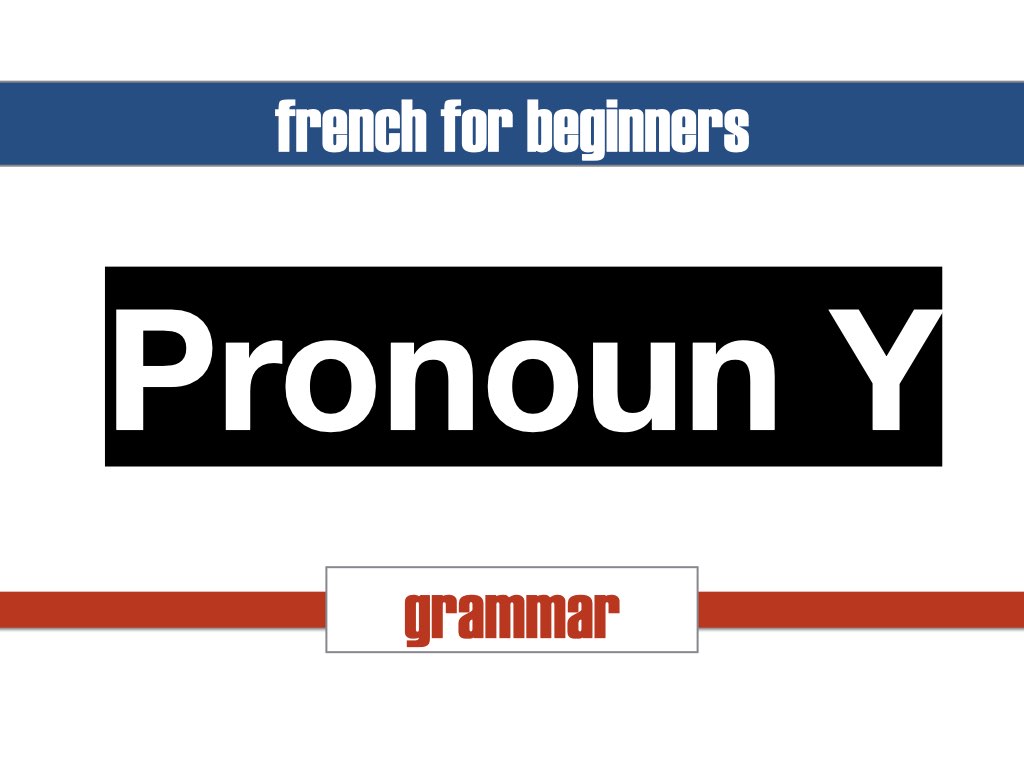The pronoun “Y” represents a place, a thing, an idea, a concept, an animal. (not a person)
Y can be a place complement.
It replaces a place complement introduced by à, à la, à l’, au, en, dans, chez, sur
Example 1:
Paul et Marie vont souvent à Londres. Ils y vont deux fois par mois.
Paul and Marie often go to London. They go there twice a month.
Y = à Londres (to London)
Example 2:
Ma sœur vit en Italie. Elle y vit depuis trois ans.
My sister lives in Italy. She has been living there for three years.
Y = en Italie (in Italy)
Example 3:
Jean est dans sa chambre. Il y est depuis ce matin.
Jean is in his room. He has been there since this morning.
Y = dans sa chambre (in his room)
Example 4:
Mon portefeuille est dans mon sac. Il y est depuis ce matin.
My wallet is in my bag. It has been there since this morning.
Y = dans mon sac (in my bag)
Attention:
The use of the pronoun Y is mandatory except with the simple future of the verb “aller.”
Observe:
Elle va à Nice. → Elle y va. She is going to Nice. → She is going there.
Elle ira à Nice. → Elle ira. She will go to Nice. → She will go.
ATTENTION to the placement of Y in the imperative, compound tenses, and negative form. (exercise)
- présent : j’y vais – je n’y vais pas ( I go there – I do not go there)
- passé composé : j’y suis allé – je n’y suis pas allé (I went there – I did not go there)
- futur simple : j’irai – je n’irai pas (I will go there – I will not go there)
- futur proche : je vais y aller – je ne vais pas y aller (I am going to go there – I am not going to go there)
- impératif présent : Vas-y ! – N’y va pas ! (Go there! – Don’t go there!)
Y can be an indirect object complement (COI).
a. Y replaces names of things, concepts, ideas introduced by “à, à la, au, aux, en “
Example 1:
Elles pensent à leurs problèmes ? Oui, elles y pensent.
Do they think about their problems? Yes, they think about them.
Y = à leurs problèmes (about their problems)
Example 2:
Tu t’intéresses aux sciences ? Oui, je m’y intéresse.
Are you interested in science? Yes, I am interested in it.
Y = aux sciences (in science)
Example 3:
Elle croit en ses chances ? Oui, elle y croit.
Does she believe in her chances? Yes, she believes in them.
Y = en ses chances (in her chances)
b. Y replaces a clause or an infinitive verb
Example 1:
Elle pense à ce qu’ils lui ont dit hier ? – Oui, elle y pense.
Is she thinking about what they told her yesterday? – Yes, she is thinking about it.
Y = à ce qu’ils lui ont dit hier (about what they told her yesterday)
Example 2:
Tu arrives à comprendre ? – Oui, j’y arrive.
Can you understand? – Yes, I can understand it.
Y = à comprendre (to understand)
Y is present in certain fixed expressions
- Ça y est ? (= It’s done)
- s’y connaître : (= to be knowledgeable about)
- Il s’y connaît bien en informatique. (He is very knowledgeable about computers.)
- Vas-y ! (= Stop / you’re exaggerating, hurry up, start, … depending on the intonation)
- Allez-y, je vous en prie. (Go ahead, please.)
- Pfff, tu t’y prends vraiment n’importe comment ! (Pfff, you’re doing it all wrong!)
Note:
In the imperative, an S must be added to the second person singular of -er verbs when followed by Y.
Example:
- Passe à Paris !
- Passes-y ! (Visit Paris! – Visit there!)
- Y = à Paris (to Paris)



